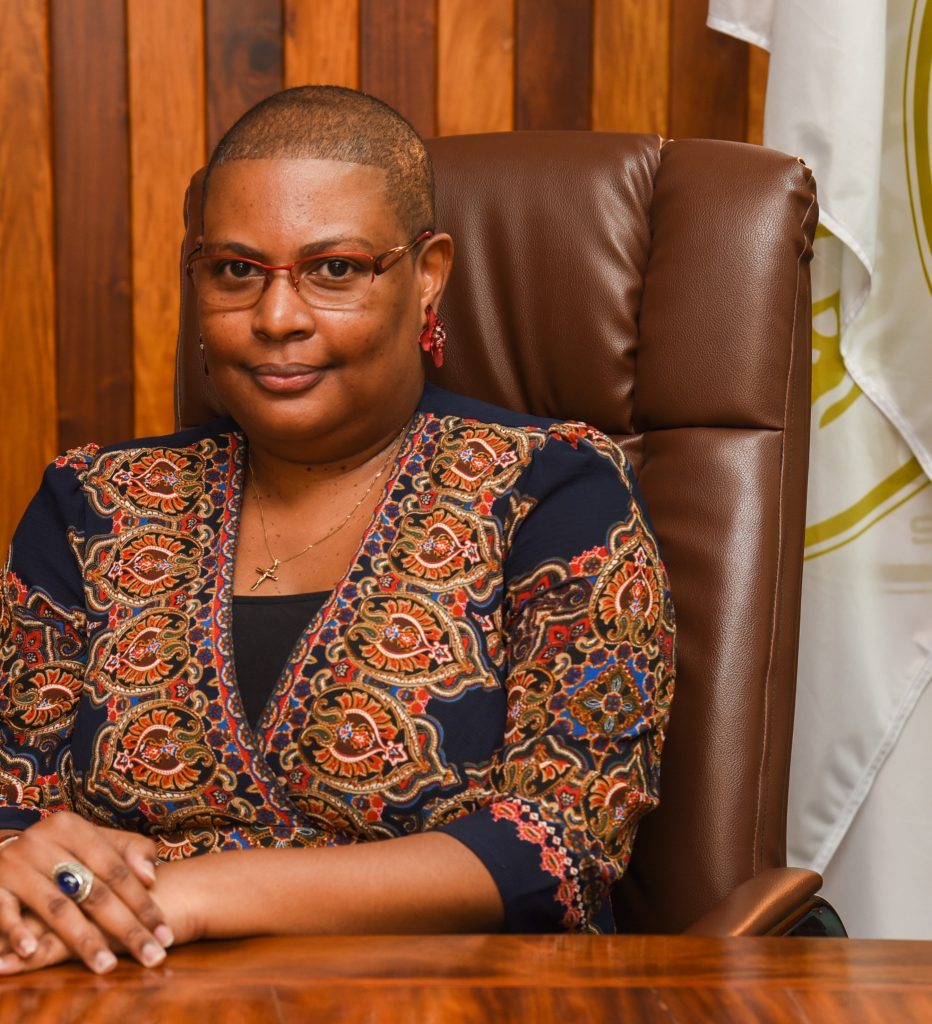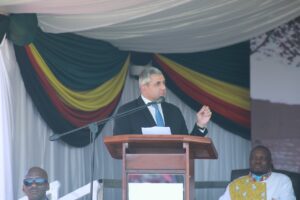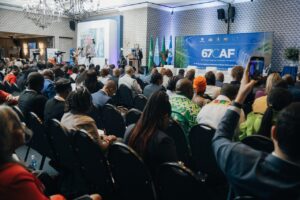For nearly a decade, Ms Caroline Abel, has served as Governor of Central Bank of Seychelles, excelling in a field which is highly dominated by males.
Even much more impressive is how she has been able to make the central bank relevant in these difficult times of Covid-19 pandemic which has hit hard at Seychelles with its tourism-dependent economy. In this exclusive conversation, Ms. Caroline opens up on what has accounted for her successes and the role the central bank is playing towards recovery.
• Can you tell us briefly about yourself and your family?
I live on the main island of Mahé, in my home district since birth where I grew up in a close-knit family with my parents and younger sister. I would describe myself as compassionate, have a passion for helping others and attach great importance to hard work and education. These are all values I try to pass on to other people I come across in all walks of life.
Despite my responsibilities at the helm of the institution that has the crucial role of ensuring economic and financial stability, I also enjoy other things, such as going to church and reading, which the latter I firmly believe is important to keep abreast of the latest development. I also value my family, which I would describe as my pillar of support in all circumstances, and I try to spend as much time with them as possible.
• What does it mean for you to be the first Seychellois woman to occupy this position?
The question does not fail to come up in every interview and it always presents an opportunity to highlight my firm belief that being a man or a woman makes no difference, as long as you are prepared to discharge your duties with zeal and confidence.
Since becoming Governor in March 2012, I have always focused on the role itself.
I have worked across all the different divisions and units of the Bank, which means I have received the technical training and exposure necessary to gain a holistic understanding of Central Banking. Over the years, I have also worked very closely with former governors of the Bank, which has inspired me to develop my full potential and allowed me to settle into the role of Governor.
As with every position of responsibility, particularly at the helm of an institution, you become acutely aware that you are now responsible and accountable for every decision, which can be an overwhelming thought at first. However, with time you learn to navigate and better manage the challenges and pressure of the role.
It has been an enriching experience as well as a learning curve. Most importantly, it has been and continues to be a pleasure to work with a supportive and dedicated team to collectively address any emerging challenges, take decisions and move forward to attain the objectives of this very important institution.
• Tell us about your career path within the bank up to when you were appointed as Governor. How has it been like?
My Central Banking career stems from my passion for Mathematics, which I studied along with Economics and Geography at Advanced Level at the Seychelles Polytechnic’s School of Humanities and Sciences. Adamant on gaining some work experience before undertaking further studies, I took up a junior position at the Social Security Fund in December 1993, although I had qualified for a government scholarship to pursue university studies abroad. My abilities did not go unnoticed, which led to my transfer to the Central Bank of Seychelles (CBS) in March 1994. I was formally appointed as Senior Bank Clerk in September 1994 after a six-month probationary period.
I eventually proceeded for university studies, graduating with a BA in Economics, with Distinction from the University of Leeds in 1999. I then returned to the Central Bank to work as a Research Officer in the Research and Statistics Division, progressing to become a Senior Research Officer in the same Division in 2001 and subsequently, Director of Research in 2002.
In 2004, I decided to pursue a Masters in Philosophy (MPhil) in Monetary Economics and Finance at the University of Glasgow, graduating with Distinction in 2005. Back to work in the Research and Statistics Division after my studies, a year later, I was promoted to Head of Research and Statistics, a post I held until I was appointed Deputy Governor in July 2010.
I was appointed First Deputy Governor in December 2011, following amendments to the Central Bank of Seychelles Act. My appointment as Governor came three months later, in March 2012, essentially becoming the first woman in Seychelles to hold the position. I was re-appointed to serve a second six-year term in March 2018.
• How have you managed the perceptions and stereotypes in a financial sector which is largely male dominated?
While Central Banking has been traditionally male-dominated, things have evolved in recent years. Today, we have women who used to take up more nurturing roles, choosing challenging career paths and brushing shoulders with male colleagues, including in the financial sector.
As previously mentioned, I firmly believe that being a man or a woman should not make a difference in the workplace as long as the individual is prepared to work hard and deliver his or her duties with utmost confidence.
This stance is perfectly portrayed at the Central Bank of Seychelles, where in fact, the majority of our current workforce is mostly women and where inclusivity is greatly valued and there is much emphasis on initiatives that provide the entire workforce with the encouragement and opportunity to reach their full potential and advance in their careers, regardless of their gender.
• As a small island with an economy largely dependent on tourism and having gone through a very stringent and economic reform only a few years back, what has been some of the challenges in balancing the country’s reserve and the Seychelles tourism books in the wake of Covid-19?
Given its heavy reliance on imports, having an adequate level of international reserves is critical for Seychelles. With the country’s main source of foreign exchange being tourism, and given that the tourism and travel trade was amongst the first economic sectors to be directly impacted by COVID-19, domestically, this translated into a significant reduction in foreign exchange inflows, which therefore also implies increased stress on the country’s reserves.
Considering the floating exchange rate regime in place, there were some adjustments in prices to reflect the new condition in the market and in the process, demand fell. However, the resulted reduction in demand was less than the decline in foreign exchange inflows (supply). To support the market, the Central Bank sold reserves to commercial banks through an auction process in addition to direct sales to two key government-owned importers to ensure the availability of essential goods, including fuel. Moreover, the country continued to meet all of its external payment obligations.
Amidst such environment, the management of the international reserves is being done with much emphasis being placed on ensuring that it can cover the country’s payment obligations over the longest possible timeframe. To note, the return on the portfolio of reserves invested had reduced significantly in view of the low interest rate environment due to the accommodative monetary policy stance of most major Central Banks.
• How supportive has the Central Bank been in financing or driving investments into Seychelles Tourism?
As from the second quarter of 2020, the Central Bank lowered its policy rate by 100 basis points for the second quarter and a further 100 basis points for the third quarter to support domestic economic activity and reduce financial stability risks. The Monetary Policy Rate (MPR) was maintained at 3.0% for the remainder of 2020 and was kept at that level for the first and now for the second quarter of 2021.
To support critical operating expenditures of businesses impacted by COVID-19, the Board of the Central Bank also approved two credit line facilities under a Private Sector Relief Scheme being administered by various credit-granting institutions. The first amounting to SCR500 million is being made available to Micro, Small and Medium Enterprises (MSMEs), while the second facility is for a total sum of R750 million to provide support to larger businesses.
• Any words of encouragement for young people especially women who are looking up to you and wish to be like you? What legacy would you like to be remembered with?
My advice to the youth is to seize every given opportunity, particularly to study, as education is key. In addition, one should never be afraid to follow his or her dreams when choosing a career and should be prepared to work hard and give their very best.
For women specifically, building a career may sometimes be more challenging given they also have to balance the responsibility of taking care of their families – including bearing and raising children. In spite of this, from my experience leading a workforce where the number of women stands at 65 per cent, I have seen their determination and tenacity as they go through life’s experiences while also excelling in their studies and careers.
These attributes are very important not only for women but for every individual to have. Life may not always be easy, and there will be hardships and challenges along the way, but these tests and trials should be seen as opportunities to grow and develop one’s potential.
On a final note, it is equally important to have values and principles that should remain the standard that we live by, and personally, the motto which I always apply in all my undertakings and which I would like to be remembered for is to always say the truth, irrespective of who it might offend. This is what we call integrity.
This article first appeared in the April 2021 issue of the VoyagesAfriq Travel Magazine.








